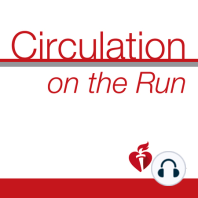16 min listen
Circulation July 23, 2019 Issue
ratings:
Length:
24 minutes
Released:
Jul 22, 2019
Format:
Podcast episode
Description
Dr Carolyn Lam: Welcome to Circulation on the Run, your weekly podcast summary and backstage pass to the journal and its editors. We're your co-hosts, I'm Dr Carolyn Lam, Associate Editor from the National Heart Center and Duke National University of Singapore. Dr Greg Hundley: And I'm Greg Hundley, Associate Editor at the Pauley Heart Center at VCU Health in Richmond, Virginia. Well Carolyn, did you ever wonder whether cardiovascular drug effects could be investigated through natural variation in the genes for the protein targets? In our feature discussion today, investigators from the British Isles, Germany, and the United States use this approach to explore the potential side effects and repurposing potential of antihypertensive drugs. Sound interesting? Well listeners, we look forward to the results later in our program, but Carolyn, how about we chat about some of the other papers in this issue? Dr Carolyn Lam: You bet Greg. So, have you ever asked yourself "What is the role of protein glycosylation in regulating LDL metabolism?" Dr Greg Hundley: That was going through my mind when we were playing basketball just the other night. Dr Carolyn Lam: Well this is truly a great study from Dr Holleboom at Academic Medical Center Amsterdam and Dr Lefeber from Radboud University Medical Center, both in the Netherlands. And their colleagues will study 29 patients of the two most prevalent types of Type 1 Congenital Disorder of Glycosylation, and these are the ALG6 and PMM2 types. They also study 23 first and second-degree relatives with a heterozygote mutation and measured their plasma cholesterol levels. LDL metabolism was studied in three cell models. They found that patients with type 1 congenital disorder of glycosylation have hypobetalipoproteinemia through increased LDL receptor expression. Carriers of the mutation in glycosylation enzymes affected in this syndrome had decreased LDL cholesterol levels compared to controls, and defects in glycosylation enzymes could play, therefore, an important role in LDL cholesterol metabolism. Dr Greg Hundley: Boy, this is pretty insightful I think, Carolyn. So, what are the clinical implications? Dr Carolyn Lam: Well, given that LDL cholesterol was also reduced in a group of clinically unaffected heterozygotes, the authors propose that increasing LDL receptor mediated cholesterol clearance, by targeting N-glycosylation in the LDL pathway, may therefore represent a novel therapeutic strategy to reduce LDL cholesterol, and of course prevent cardiovascular disease. Dr Greg Hundley: Very interesting work. You know, we just keep learning more and more about LDL. I'm going to switch and jump back with Empagliflozin. And this is a study in diabetic mice that really has an interesting in-vivo imaging component. As an imager, I was really excited about this. The article is from Dr Kengo Kidokoro from Kawasaki Medical School. And we don't often talk about it, but listeners, if you have a chance, there's a very interesting video-enhanced file associated with this article, and if you can download it, it's really just so cool with multiple image clips demonstrating an operative mechanism of SGLT2 inhibition on renal function. And it really gives us an opportunity to revisit renal function. Quick quiz Carolyn. In diabetic kidney disease, is glomerular hyperfiltration good or bad? Dr Carolyn Lam: Bad. Dr Greg Hundley: Yeah, absolutely. So, hyperfiltration is characteristically observed at earlier stages of diabetic kidney disease and involves activation of the renin-angiotensin-aldosterone system at the efferent arteriole and tubuloglomerular feedback mechanisms, especially at the afferent arteriole. So, as they go through this, just picture in your mind that glomerulus and
Released:
Jul 22, 2019
Format:
Podcast episode
Titles in the series (100)
Circulation June 6, 2017 Issue: Circulation Weekly: Your Weekly Summary & Backstage Pass To The Journal by Circulation on the Run
